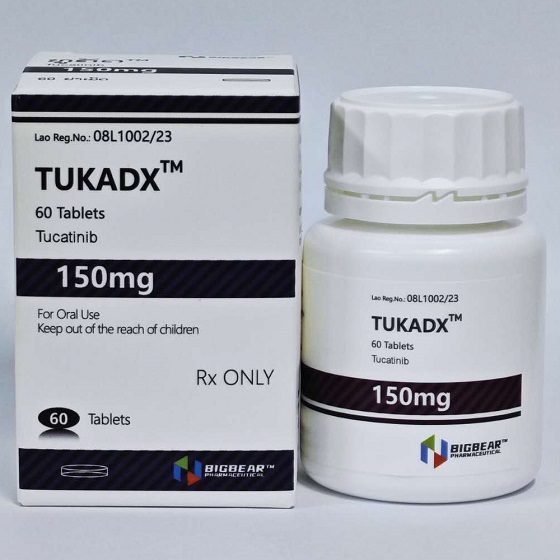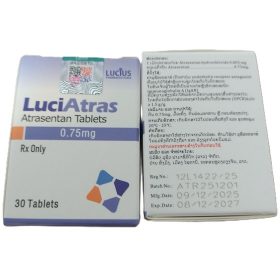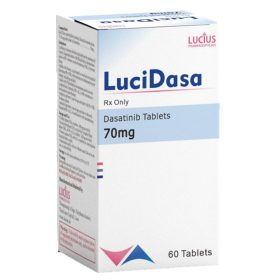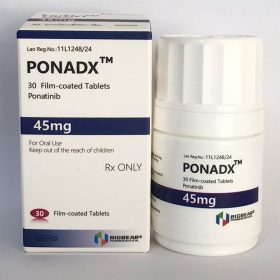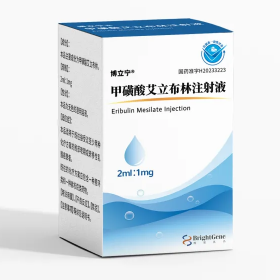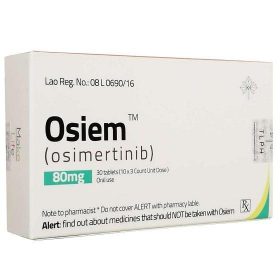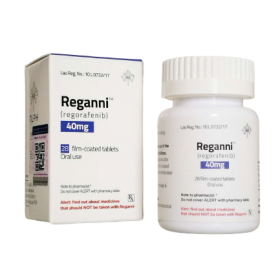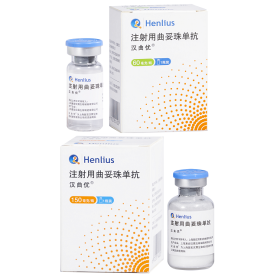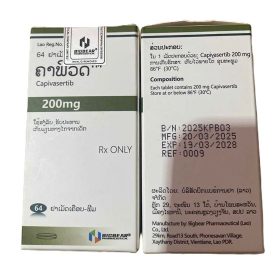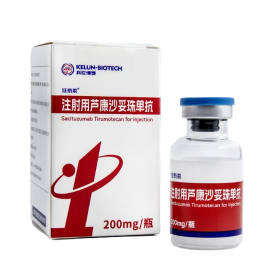- Details
- Description
-
Packaging Size60T/bottle
-
Strength150mg
-
CompositonTucatinib
-
TreatmentHER2-positive breast cancer,RAS wild-type HER 2-positive unresectable or metastatic colorectal cancer
-
FormTablet
-
BrandTUKADX
-
Quantity Unit150mg*60T/bottle
-
ManufacturerBIGBEAR Pharma,Laos PDR
Tucatinib is an anticancer medication used for the treatment of HER2-positive breast cancer. It is a small molecule inhibitor of HER2.
Advanced or Metastatic Breast Cancer
Indicated in combination with trastuzumab and capecitabine for treatment of advanced unresectable or metastatic human epidermal growth factor (HER2)-positive breast cancer (including brain metastases) in patients who have received ≥1 anti-HER2-based regimens in the metastatic setting
300 mg PO BID in combination with trastuzumab and capecitabine
Continue until disease progression or unacceptable toxicity
Refer to the full prescribing information for trastuzumab and capecitabine for additional information
Colorectal Cancer
Indicated in combination with trastuzumab for RAS wild-type HER 2-positive unresectable or metastatic colorectal cancer that has progressed following treatment with fluoropyrimidine-, oxaliplatin-, and irinotecan-based chemotherapy
300 mg PO BID
Continue until disease progression or unacceptable toxicity
Refer to the full prescribing information for trastuzumab for additional inforation
Dosage Modifications
Refer to the full prescribing information for trastuzumab and capecitabine for dosage modifications
Dose reductions for adverse reactions
- First reduction: 250 mg PO BID
- Second reduction: 200 mg PO BID
- Third reduction: 150 PO BID
- Unable to tolerate 150 mg PO BID: Permanently discontinue
Diarrhea
- Grade 3 without antidiarrheal treatment: Initiate or intensify appropriate medical therapy; hold until recovery to Grade ≤1, then resume at same dose
- Grade 3 with antidiarrheal therapy: Initiate or intensify appropriate medical therapy; hold until recovery to Grade ≤1, then resume at same dose or at next lower dose
- Grade 4: Permanently discontinue
Hepatotoxicity
- Grade 2 bilirubin (>1.5 to 3x ULN): Hold until recovery to Grade ≤1, then resume at same dose
- Grade 3 ALT or AST (>5 to 20x ULN) OR Grade 3 bilirubin (>3 to 10x ULN): Hold until recovery to Grade ≤1, then resume at next lower dose
-
Permanently discontinue
- Grade 4 ALT/AST (>20x ULN) OR Grade 4 bilirubin (>10x ULN)
- ALT/AST >3x ULN AND bilirubin >2x ULN
Other adverse reactions
- Grade 3: Hold until recovery to Grade ≤1, then resume at next lower dose level
- Grade 4: Permanently discontinue
Coadministration with strong CYP2C8 inhibitors
- Avoid coadministration; if unavoidable, reduce tucatinib to 100 mg PO BID
- After discontinuing strong CYP2C8 inhibitor for 3 elimination half-lives, resume tucatinib dose taken before initiating inhibitor
Renal impairment
- Mild-to-moderate (CrCl 30-89 mL/min): No dosage adjustment necessary
- Severe (CrCl <30 mL/min): Use in combination with trastuzumab and capecitabine is not recommended; capecitabine is contraindicated in patients with severe renal impairment
Hepatic impairment
- Mild-to-moderate (Child-Pugh A or B): No dosage adjustment necessary
- Severe (Child-Pugh C): Reduce to 200 mg BID
Dosing Considerations
Verify pregnancy status of females of reproductive potential before initiating
Select patients for unresectable or metastatic colorectal cancer
- Based on presence of HER2 overexpression or gene amplification and RAS wild-type

